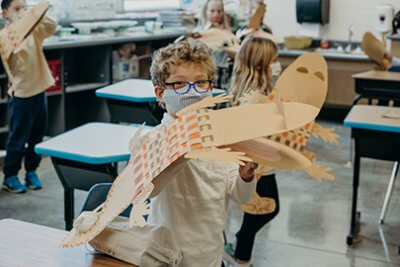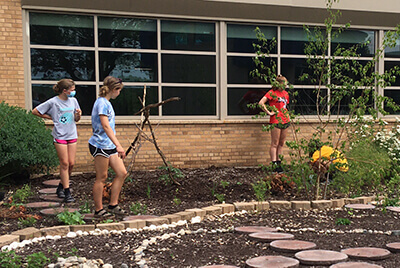July 21, 2021
 by Dr. Bill Hudson, Head of School
by Dr. Bill Hudson, Head of School
Even though it can be a little quiet and sometimes lonely working over the summer, it is a delight to witness how the grounds come alive. My office overlooks the rain garden and reclaimed prairie at the north end of the campus and the indigenous flowers that only bloom in the summer are stunning. From time to time, I also stroll through our gardens outside the Middle School and our new garden outside the Harrison Library. We are fortunate to have such a beautiful campus and a committed cadre of teachers, staff, students, and parents who lovingly care for it over the summer months.
Great care has also gone into preparing for the new school year. This email serves as your re-introduction to life during a pandemic on campus at MPA. We’ve spent a great deal of time this spring and summer researching the progression of the pandemic, consulting with educational and medical experts, and seeking guidance from our Community Advisory Group to design a plan that continues to be flexible, nimble, and always attuned to the latest science. Just like last summer and even throughout the school year, please know that the plan and all of our safety measures will change based on emerging information, both locally and nationally. We remain wholly committed to being safe, being smart, and being kind and ask all of our families to recommit to that intention. We cannot wait to have the entire community back on campus this August—including families! Read More
 New Family Orientations and Back To School Days will be held on campus throughout August. These will be small events designed for maximum safety.
New Family Orientations and Back To School Days will be held on campus throughout August. These will be small events designed for maximum safety. Do you have room to spare? Space in your heart for another family member? A desire to expand your family’s perspective of the world? MPA is seeking host families for several international students for the 2021-22 school year.
Do you have room to spare? Space in your heart for another family member? A desire to expand your family’s perspective of the world? MPA is seeking host families for several international students for the 2021-22 school year. Mounds Park Academy, including the building and grounds, business office, heads office, development, admissions, communications, athletics offices, and all division offices will be closed July 3-11, 2021. We appreciate your patience while employees spend time with their families. We will respond to emails and voicemails immediately upon our return!
Mounds Park Academy, including the building and grounds, business office, heads office, development, admissions, communications, athletics offices, and all division offices will be closed July 3-11, 2021. We appreciate your patience while employees spend time with their families. We will respond to emails and voicemails immediately upon our return! This past year, our community volunteers found so many creative ways to stay connected and involved. Many found their time and love pouring into one of the newer additions to campus–our library gardens. Since the gardens just turned one year old this summer, this year is the first time that it has had volunteer tending to its plants and foraging its vegetables. While there are currently five dedicated parent volunteers, more recently, several Upper and Middle School student volunteers are spending their time taking care of our beloved outdoor space, too!
This past year, our community volunteers found so many creative ways to stay connected and involved. Many found their time and love pouring into one of the newer additions to campus–our library gardens. Since the gardens just turned one year old this summer, this year is the first time that it has had volunteer tending to its plants and foraging its vegetables. While there are currently five dedicated parent volunteers, more recently, several Upper and Middle School student volunteers are spending their time taking care of our beloved outdoor space, too! Congratulations to Lauren Hernandez who is moving from Communications Coordinator to Communications and Marketing Manager. Get to know Ms. Hernandez!
Congratulations to Lauren Hernandez who is moving from Communications Coordinator to Communications and Marketing Manager. Get to know Ms. Hernandez! After winning the 2020 Minnesota state championship in Nordic skiing, Henry Snider was nearly speechless. “I always dreamed of being a state champion,” he told the Pioneer Press. “It’s completely amazing. Just crazy. Lots of training over the summer, dedication, loving the sport.”
After winning the 2020 Minnesota state championship in Nordic skiing, Henry Snider was nearly speechless. “I always dreamed of being a state champion,” he told the Pioneer Press. “It’s completely amazing. Just crazy. Lots of training over the summer, dedication, loving the sport.” Jerusalem Thao ’20 came to MPA as a tenth grader and made an immediate impact. As a Panther, he excelled in both soccer, and his primary sport, tennis. He was captain of the soccer team, IMAC all conference, and a recipient of the coaches’ award.
Jerusalem Thao ’20 came to MPA as a tenth grader and made an immediate impact. As a Panther, he excelled in both soccer, and his primary sport, tennis. He was captain of the soccer team, IMAC all conference, and a recipient of the coaches’ award. Playing football for the MPA/SPA co-op team, Adam Frudden ’08 formed lifelong friendships and honed a strong work ethic that served him well far beyond the gridiron.
Playing football for the MPA/SPA co-op team, Adam Frudden ’08 formed lifelong friendships and honed a strong work ethic that served him well far beyond the gridiron. Adrienne (DeMarais) Zertuche ‘03 put together a very impressive soccer resume playing for long time head girls soccer coach Mike Scinto.
Adrienne (DeMarais) Zertuche ‘03 put together a very impressive soccer resume playing for long time head girls soccer coach Mike Scinto.